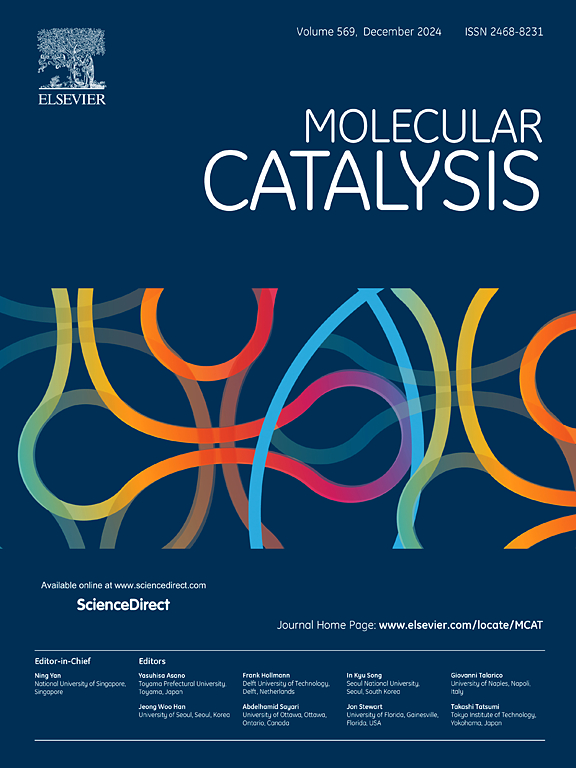揭示金属促进剂(Zn, Cu, Co, Mn和Mg)在Fe-K催化剂上CO2加氢制轻烯烃中的作用
IF 3.9
2区 化学
Q2 CHEMISTRY, PHYSICAL
引用次数: 0
摘要
有效利用二氧化碳对减轻环境问题至关重要。研究了过渡金属(Zn、Cu、Co、Mn)和碱土金属Mg对Fe-K催化剂CO2加氢制轻质烯烃的促进作用。本文采用活性炭模板法制备了一系列不同金属改性的Fe-K催化剂。该方法大大提高了催化剂的分散性,使高性能Fe-K催化剂的合成成为可能。揭示了催化剂性能和选择性依赖于促进剂的机理。Zn的促进作用显著增强了Fe的色散和电子转移,从而得到富电子Fe5C2和优异的光烯烃选择性,其值为35.00%。Co使CO2转化率达到最大(46.88%)。而Co促进H2解离,促进正构烷烃产物的生成,降低C2-C4烯烃-石蜡比。Cu的加入,在大大增强氧化铁的还原和渗碳行为的同时,显著减弱了对CO2的吸附。Mn与铁的强相互作用导致Fe-K催化剂的还原渗碳过程复杂,碱度大大降低。Cu、Mg和Mn的加入极大地促进了C-C向较重碳氢化合物的耦合。这些发现提供了对启动子作用的全面理解,并为设计用于CO2尾部加氢产物分布的先进Fe-K催化剂提供了合理的策略。本文章由计算机程序翻译,如有差异,请以英文原文为准。

Unraveling the role of metal promoters (Zn, Cu, Co, Mn and Mg) in CO2 hydrogenation to light olefins over Fe-K catalysts
Efficient CO2 utilization is crucial for mitigating environmental concerns. In this study, the promoting effect of transition metal (Zn, Cu, Co and Mn) and alkaline earth metal Mg on Fe-K catalysts for CO2 hydrogenation to light olefins were investigated. A series of Fe-K catalysts with different metal modified were prepared using the activated carbon template method proposed in this work. This method greatly improves catalyst dispersion, enabling the synthesis of high-performance Fe-K catalysts. The promoter-dependent mechanisms governing catalyst performance and selectivity were revealed. Zn promotion significantly enhances Fe dispersion and electron transfer, resulting in electron-rich Fe5C2 and exceptional light olefin selectivity with a value of 35.00 %. Co maximizes CO2 conversion (46.88 %). However, Co promotes H2 dissociation, enhancing the formation of n-alkane products and reducing C2-C4 olefin-to-paraffin ratio. Adding Cu, while greatly enhancing the reduction and carburization behavior of iron oxides, significantly weakens the adsorption of CO2. The strong interaction between Mn and iron species leads to a complex reduction and carburization process of Fe-K catalyst and greatly reduces its basicity. The addition of Cu, Mg, and Mn greatly promote C-C coupling towards heavier hydrocarbons. These findings provide a comprehensive understanding of promoter roles and offer a rational strategy for designing advanced Fe-K catalysts for tailed CO2 hydrogenation product distributions.
求助全文
通过发布文献求助,成功后即可免费获取论文全文。
去求助
来源期刊

Molecular Catalysis
Chemical Engineering-Process Chemistry and Technology
CiteScore
6.90
自引率
10.90%
发文量
700
审稿时长
40 days
期刊介绍:
Molecular Catalysis publishes full papers that are original, rigorous, and scholarly contributions examining the molecular and atomic aspects of catalytic activation and reaction mechanisms. The fields covered are:
Heterogeneous catalysis including immobilized molecular catalysts
Homogeneous catalysis including organocatalysis, organometallic catalysis and biocatalysis
Photo- and electrochemistry
Theoretical aspects of catalysis analyzed by computational methods
 求助内容:
求助内容: 应助结果提醒方式:
应助结果提醒方式:


